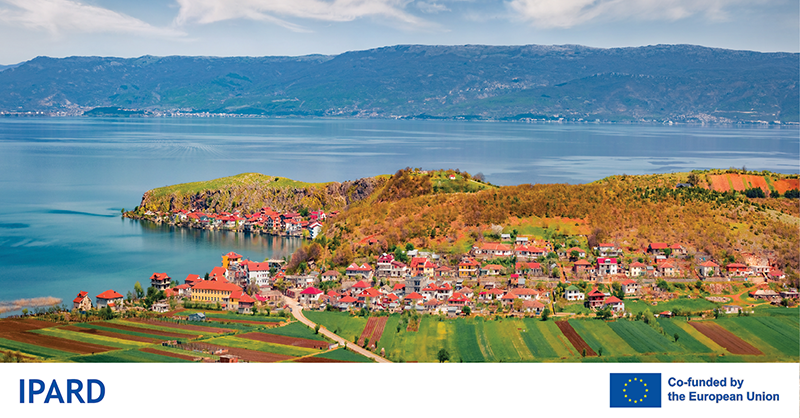
The European Commission adopted rural development programmes (IPARD) under the instrument for pre-accession assistance for Albania, North Macedonia, Serbia and Turkey, with a budget of €112, €97, €288 and €430 million respectively. The programmes provide the basis for EU support in the field of agriculture, rural development and food security for the period 2021-27, particularly important in the current geo-political context. This EU support, together with national public and private contributions, are expected to generate in total over €2 billion investment in rural areas of Western Balkans and Turkey. The IPARD programmes are also a clear signal of the EU’s support to investing in agriculture and rural development in the Western Balkans and Turkey, as an element of strengthening their resilience.
With the implementation of IPARD programmes, the beneficiary countries pursue their objectives related to increasing competitiveness of the agri-food sector, sustainable management of natural resources, climate action and improving attractiveness of their rural areas. The programmes also contribute to the objectives of the Green Agenda for the Western Balkans and the Green Deal more broadly. This will be done for example through:
- improving manure and waste management,
- modernisation of assets,
- renewable energy production and increasing energy efficiency,
- organic production,
- transfer of innovative and environmentally friendly technologies and environmentally
- climate-sound farming production methods.
The programmes provides also a significant contribution to the implementation of the Economic and Investment Plan for the Western Balkans; hence to the long-term economic recovery of the region and convergence with the European Union. Furthermore, the IPARD programmes support investments to align with EU standards, including upgrading buildings, machinery, and equipment. They also help establishing short supply chains, increasing rural areas growth potential and their attractiveness to prevent depopulation via better infrastructure, diversifying income-generating economic activities and fostering rural employment, in particular among women and youth.
To achieve these objectives, the beneficiary countries have at their disposal 13 measures established at the EU level. The four beneficiary countries will make use of 10 out of the 13 available measures:
- Measure 1 – "Investments in physical assets of agricultural holdings" helps farms invest in buildings or technologies to increase the efficiency, competitiveness, and more sustainable agricultural production.
- Measure 3 – "Investments in physical assets concerning processing and marketing of agricultural and fishery products" seeks to ensure projects in food processing companies meet EU safety and environmental standards.
- Measure 4 – "Agri-environment-climate and organic farming" aims to promote farming management practices and production methods, which improve the state of the environment, natural resources and mitigate and/or adopt to climate change.
- Measure 5 – "Implementation of local development strategies – LEADER approach" supports local action groups, representing a wide range of multi-sectoral private and public partners, in implementing their bottom-up local development strategies, which contributes to economic, social, cultural and environmental improvements of local areas.
- Measure 6 – “Investments in rural public infrastructure” targets economic, social and territorial development of rural areas through the development of physical infrastructure which improves rural population’s living standards and overall attractiveness of rural areas.
- Measure 7 – "Farm diversification and business development" is a tool for rural businesses and farming families seeking to develop non-agricultural activities, thus creating new jobs, diversifying income sources and reversing rural depopulation.
- Measure 8 – “Improvement of skills and competences” is to contribute to the improvement of the occupational skills and competences of persons engaged in the agricultural, food, and forestry sectors.
- Measure 9 – "Technical assistance" aims to build modern public administrations for agriculture and rural development by supporting training, analyses, programme monitoring, capacity building.
- Measure 10 – “Advisory services” has as objective to strengthen the advisory services which will contribute to improving the economic and environmental performance of farms and rural micro enterprises.
- Measure 11 – “Establishment and protection of forests” promotes the restoration, maintenance and enhancement of forestry ecosystems whilst addressing the challenge of climate change.
Each country presents their programmes to the European Commission for approval. Once approved, they are managed by national institutions. These ensure the execution of the programmes and that funds are transferred to applicants relying on sound financial management principles. This contributes to building national institutions and governance in agriculture and rural development. The Commission supports all parties involved in the management and control of the programmes and funds.
Background
IPARD is an integral part of the broader EU pre-accession strategy under the Instrument for Pre-Accession Assistance (IPA). Through this tool, the EU provides the beneficiary countries with financial and technical help, with the aim of developing their farming, food production and rural development structures in a sustainable way, aligning their agricultural and rural development policies with the EU's common agricultural policy and adapting their agriculture and food sector with the EU food, hygiene and environmental standards.
More information
The IPARD programmes will be available on the beneficiary countries’ IPARD websites:
Related links
Details
- Publication date
- 23 March 2022
- Author
- Directorate-General for Agriculture and Rural Development
